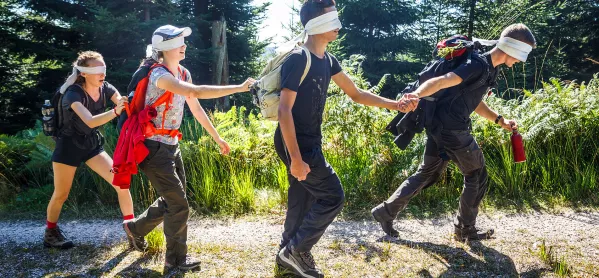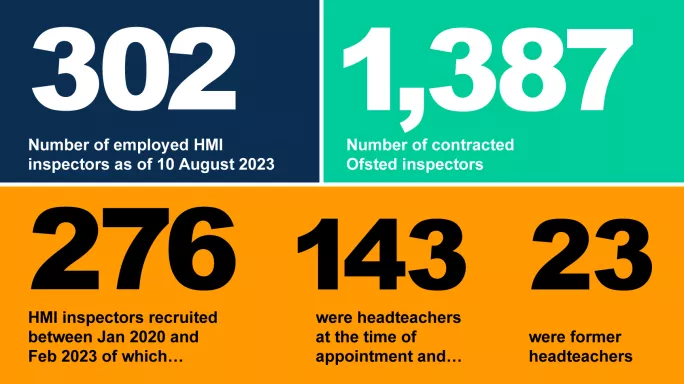4 in 10 senior Ofsted inspectors have never been a head

Four in 10 senior inspectors employed by Ofsted in the past three years have never been a headteacher, Tes can reveal.
The figures come amid widespread concern - fuelled by the death of headteacher Ruth Perry earlier this year - that “toxic” inspections take far too little account of the pressures faced by school leaders.
Between January 2020 and February 2023, Ofsted recruited 276 His Majesty’s Inspectors (HMI), who are employed by the watchdog directly and are expected to have more leadership experience than contracted inspectors, who work part-time.
Some 60 per cent (166) of the HMI were either a headteacher at the time of appointment (143) or had previously been a headteacher (23), according to figures obtained by Tes.
This means 110 were appointed in the past three years without having been a head, despite many leaders feeling that such experience is vital for success in the role. There were 302 HMI overall, as of 10 August 2023.
Seamus Murphy, chief executive officer at the six-school Turner Schools Trust, said: “Lack of headship experience is a problem, especially for lead inspectors.”
- News: Sharp rise in Ofsted reports changed after school complaints
- Feature: Is there any way back for Ofsted?
- Background: How are Ofsted inspections changing?
- Ofsted crisis: Heads back call to halt inspector work
A lack of insight into the “hard work” involved in school improvement leaves heads “lacking confidence in those leading the inspections”, and at times having to explain “basic practice” to individuals with “limited leadership experience”, he warned.
Ofsted has come under fire in recent years for failing to appreciate the pressure and strain that heads have been under during the pandemic and as schools work to help pupils catch up with lost learning, often alongside severe funding pressures.
One teachers’ leader has described Ofsted as imposing a “reign of terror” on schools, and - as Tes has revealed today - the proportion of schools that have complained about the process of their inspection has risen year-on-year for the past five years.
The inspectorate has responded to some of the criticism levelled at it in recent months by announcing a series of changes to inspections, including a consultation on its complaints system.

However, some leaders feel that more inspectors with headship experience would lead to fairer judgements for schools, which should reduce the need for complaints in the first place.
Lee Mason-Ellis, CEO of The Pioneer Academy, which runs 17 schools, said that while not all heads make good inspectors, “it is important that all inspection teams have experience of headship”.
This is so they can have “empathy with school leaders and the school community”, particularly when vulnerable schools are being rebuilt, he said.
HMI are not required to have worked as heads. Instead, they must have at least five years’ “successful leadership experience in education provision, at middle or senior levels”, with responsibility for people and resource management as well as “a proven track record of achieving consistent improvement in the education sector”.
Contracted Ofsted inspectors
This compares with contracted inspectors, who need just five years’ “successful teaching experience within the relevant remit”, a further two years of “successful and substantial management experience in the relevant area, up-to-date knowledge and practice in the sector”, and “experience gained from more than one institution”.
However, some feel the criteria should be tightened amid fears that judgements are inconsistent and concerns over the quality of some inspection teams.
Adrian Rogers, chief executive of the 16-school Chiltern Learning Trust in Bedfordshire, said HMI should be either former heads or have held a “very senior role”, such as at the Department for Education or in a trust or local authority.
He said: “If an HMI has been a head, they have a greater understanding of the nuances of school improvement, school priorities and pace of change.”
‘Bizarre and inconsistent judgements’
Former HMI Frank Norris said he was “truly shocked” when a middle leader at a local primary school asked recently whether he would be willing to support her application to become an HMI.
“You need to understand the pressure and the often conflicting issues that you face as a senior leader before you can get to grips with understanding the effectiveness of leadership and management,” said Mr Norris, who is now education adviser to the Northern Powerhouse Partnership.
For former chief inspector Sir Michael Wilshaw, the current situation is a result of the 2019 inspection framework’s focus on curriculum, “with its underlying assumption that subject leaders...can extrapolate judgements on a relatively small number of departments to a judgement on whole school performance”.
“This is patently a nonsense and is leading to some bizarre and inconsistent judgments,” he said.
However, not all see headship as an essential qualification for inspection work. Tom Middlehurst, curriculum, assessment and inspection specialist at the Association of School and College Leaders, said “other leadership roles in a school or college or other education setting” could be sufficient.
But all lead inspectors should have relevant leadership experience in the phase they are inspecting, he added.
No central record of inspectors’ school roles
It is not uncommon for leaders to complain that inspectors lack understanding of their phase or particular context.
But it is impossible to scrutinise where gaps in experience may lie across Ofsted’s inspection workforce because the watchdog says it does not know where all its inspectors previously worked.
Ofsted also lacks a central record of inspectors’ subject specialisms, despite its 2019 inspection framework having a greater focus on “deep dives” to scrutinise schools’ curriculum, involving detailed conversations about how a subject is taught.
Tes asked Ofsted how many inspectors had experience working in primaries, secondaries and special schools. We also asked for a breakdown of inspectors’ subject specialisms, and the most senior role they had held.
But information on applicants’ job history is only held for “a short period of time…consistent with The National Archives’ recommendations”, the inspectorate said.
Mr Middlehurst said this was “disappointing”. Providing an overview of the educational phases and subject specialisms from which inspectors are drawn “would help to understand whether there is sufficient breadth of expertise and experience, or if there are gaps which need addressing”, he said.
Mr Murphy called for a register of inspectors’ experience to “help in identifying gaps in knowledge and background”.
An Ofsted spokesperson said: “All our schools HMI are required to hold a minimum of five years’ leadership experience at a senior level in schools, with a proven track record of achieving consistent improvement.
“Our inspectors are fully trained in our framework, and have significant experience of education and as such would be able to inspect any phase or subject.”
Register with Tes and you can read two free articles every month plus you'll have access to our range of award-winning newsletters.
topics in this article



